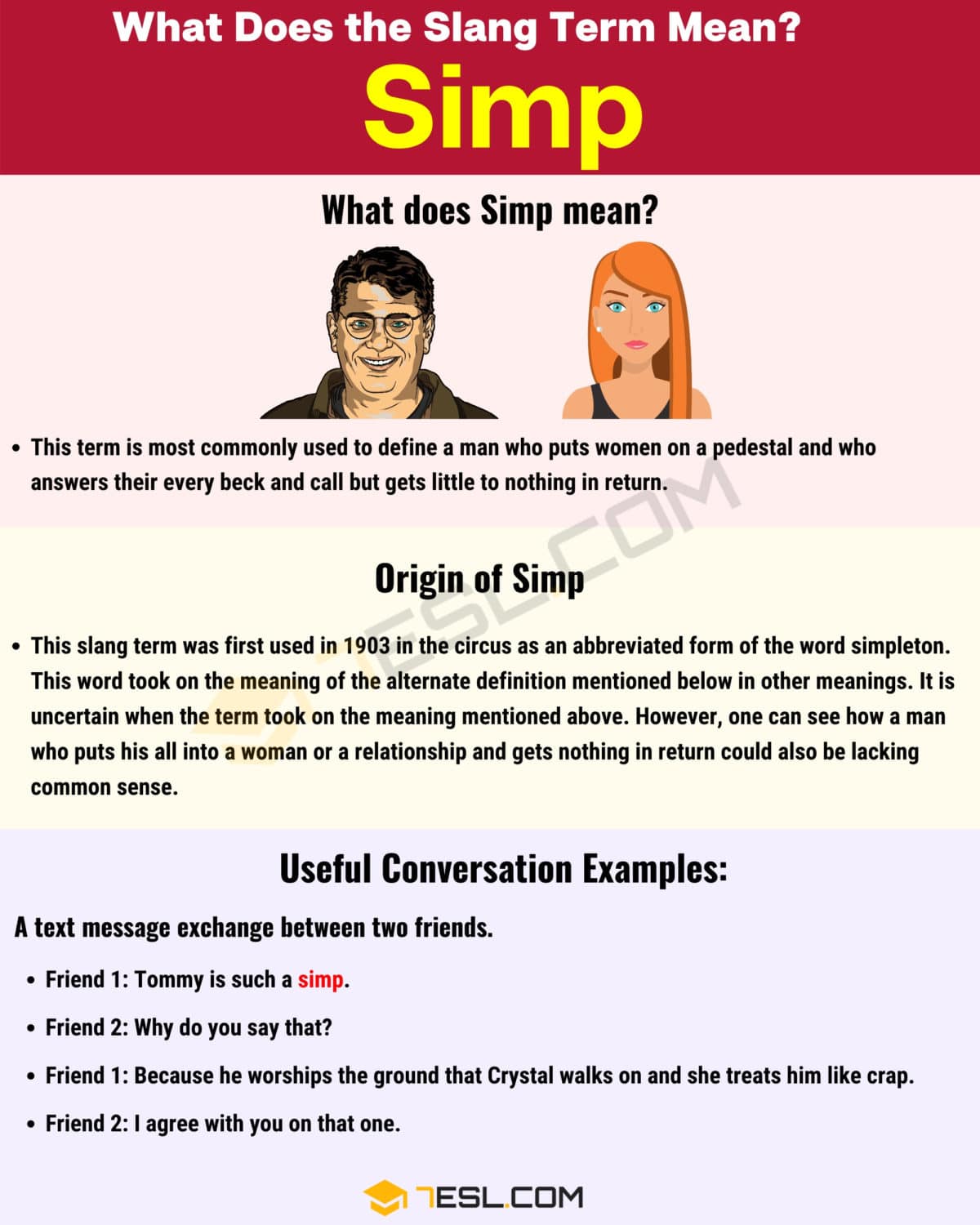The "Simp" Slang: Definition, Usage & Cultural Impact
Is "simp" just a harmless bit of slang, or does it represent something more insidious? The term, born from the internet's echo chambers, has evolved into a loaded insult, reflecting shifting dynamics in relationships and the often-turbulent landscape of online interactions.
The modern lexicon, particularly within the digital sphere, is in a constant state of flux, and few words exemplify this as vividly as "simp." It's a word that has wormed its way into everyday vernacular, popping up in memes, social media discussions, and even casual conversations. But what exactly does it mean, and why has it become such a contentious term?
The initial definition of "simp" is fairly straightforward, at least on the surface. Urban Dictionary, a crowdsourced dictionary frequently cited as a definitive source for internet slang, offers several definitions. The top one generally describes "someone who does way too much for a person they like." Other definitions expand on this, painting a picture of an individual, often a man, who is overly attentive, submissive, or even obsequious in an effort to gain the affection or attention of another person, frequently a woman, with little or no reciprocation. The Free Dictionary also points out the term is an abbreviation of 'simpleton'.
- Uncover The Sensual World Fifty Shades Trilogy Deals Reviews
- Czech Hunter Exclusive Content Behindthescenes Insights
However, the simplicity of the initial definition belies the complexity of its usage and the baggage it carries. A social media behavior study found a significant divide in how the term is perceived: 69% of respondents found it derogatory, while 31% did not, illustrating the differing perspectives on its meaning. This dichotomy underscores the ongoing cultural conversation about relationships in the age of social media, where expressions of admiration and affection are often scrutinized and sometimes weaponized.
The term's origins can be traced to several online spaces. Rap music and manosphere forums were early adopters, and the rise of TikTok significantly amplified its usage. Ironically or jokingly, "simp" has taken on a life of its own.
The term "simp" has evolved and taken on different connotations depending on the context. It is, in essence, a term of judgment, a label often leveled at men who are perceived as being overly eager to please women. This behavior, in the eyes of the term's detractors, is often seen as a sign of weakness, desperation, or a lack of self-respect. The irony, of course, is that the very act of calling someone a "simp" can be seen as a performative display of dominance and a way to assert oneself within a particular social hierarchy. Some also consider that calling someone a simp is a result of toxic masculinity and sexism.
- Breaking Fernando Amaya Charged In Fatal Shooting At 7500 Cook Road
- Marin Hinkle Hot Photos Scenes Sexy Moments Revealed
The word "simp" also carries historical context. It's not just a current slang term; it has roots in earlier eras. It reflects evolving societal views on gender roles, dating, and expectations within romantic relationships. It's an expression of frustration in the modern dating landscape, where traditional rules seem to have crumbled, and the path to intimacy is often paved with digital communication and online validation. The term often represents a backlash against those who may be perceived as defying the standard definition of masculinity, specifically the men who are willing to express emotional vulnerability or put forth effort into romantic endeavors.
Here's a basic breakdown of the term, presented in a way that can easily be adapted for a WordPress website:
| Term | Simp |
| Origin | Rap music, manosphere forums, TikTok |
| Type | Slang |
| Part of Speech | Noun and Verb |
| Noun Meaning | A simpleton, a foolish person, or someone who shows excessive devotion to a love interest. |
| Verb Meaning | To show excessive devotion to someone or something. To try too hard to please someone else, or to like and admire someone very much. |
| Associated Terms | Sycophant, simpleton, orbiters, white knight, soyboy, cuck |
| Context | Internet slang, often used as a pejorative |
| Common Use | To belittle men for being overly submissive or subservient to women |
| Criticism | Associated with toxic masculinity and sexism. |
| Reference | Urban Dictionary |
While the word is often aimed at men, the gender roles are not necessarily fixed. The dynamic is evolving, as the term can be applied to anyone perceived as being excessively devoted to another person, regardless of their gender. TikTok, for instance, hosts a number of "simp nation" videos featuring women, illustrating that the concept is adaptable to various relationship dynamics.
One of the primary criticisms leveled against the term "simp" is its association with toxic masculinity and its potential to reinforce harmful gender stereotypes. The use of "simp" can pressure men to conform to traditional ideals of aggression and dominance while simultaneously objectifying women. The term can be a tool for shaming men for expressing emotions or acting in ways that are not traditionally considered masculine.
The very act of labeling someone a "simp" is often viewed as a way to undermine their actions and motivations. It questions the sincerity of their feelings, implying that they are acting out of ulterior motives or a misguided attempt to win affection. This can be particularly damaging in an age where genuine connection and emotional vulnerability are often at odds with the pressures of social media and online performance.
The implications of the "simp" phenomenon extend beyond the realm of dating and relationships. The term reflects broader societal anxieties regarding the performance of masculinity, the changing dynamics of power between genders, and the impact of social media on how we interact with each other. It is a symptom of an era where self-presentation is paramount, and genuine connection is often obscured by the curated realities of online life.
As the term has gained traction, it has been adopted into several online communities, like incel forums, where it is often used as a tool to ridicule and belittle men who are perceived as being overly subservient to women. The term is used alongside other insults, like "beta" or "cuck," to reinforce a rigid hierarchy of masculinity.
The "simp" label, therefore, has also become a tool for policing behavior and reinforcing societal norms. It's a way to discourage men from expressing vulnerability, from being supportive, and from displaying any behavior that might be deemed "unmanly" within a given social context. This is a situation that perpetuates harmful stereotypes and undermines efforts to create a more inclusive and equitable society.
The evolution of "simp" reveals the changing dynamics in social media and relationships. Online culture, including the slang that comes with it, creates a space where individuals can share experiences, explore different viewpoints, and challenge conventional ways of thinking. It also, however, creates an environment where opinions, judgments, and insults can spread quickly.
As "simp" has gained popularity, it has inevitably encountered criticism, and the definition of this term has changed. Some people feel that the use of the word perpetuates traditional gender stereotypes and discourages men from expressing any emotion that is not considered traditionally masculine. Others see it as a legitimate way to criticize behaviors they see as inappropriate or manipulative, especially within the context of romantic relationships. Both sides reflect the changing landscape of online relationships.
It's important to understand the evolution of "simp" and its effects. When someone is referred to as a "simp," it may initially be offensive. It might make you question how you present yourself to others, especially on social media. The word itself is more than just an abbreviation of "simpleton" or "sycophant," despite how it may appear.
The term serves as a shorthand for complex social dynamics. Its meaning is subject to interpretation and debate, and it functions as a reflection of the current societal norms, trends, and power dynamics. Understanding this term is an example of the evolving nature of language in the internet age.
Ultimately, "simp" is a reflection of how we navigate relationships and self-perception in the digital age. It's a testament to the way language adapts to cultural shifts and the need to express complex feelings and observations in a concise and shareable way. Its future usage will most likely continue to mirror the ever-changing landscape of online interaction and the ongoing evolution of our social norms.



Detail Author:
- Name : Hillary Wintheiser
- Username : johnston.calista
- Email : qkohler@yahoo.com
- Birthdate : 1997-03-31
- Address : 6770 Mireille Vista Suite 093 Port Griffinside, DC 33680-1824
- Phone : 1-225-251-3281
- Company : Towne PLC
- Job : Law Enforcement Teacher
- Bio : Exercitationem libero est tempora voluptas exercitationem. Cum aspernatur veritatis voluptatem ut fugit aliquid incidunt voluptatum. Quam quis rerum ullam tempore quae.
Socials
instagram:
- url : https://instagram.com/raud
- username : raud
- bio : Qui omnis voluptas nemo aliquid quia et. Facilis eligendi beatae consequuntur voluptatem quidem.
- followers : 1909
- following : 2543
facebook:
- url : https://facebook.com/delpha_rau
- username : delpha_rau
- bio : Repudiandae quasi rerum ullam dolorum dignissimos sequi sunt.
- followers : 2780
- following : 1138
linkedin:
- url : https://linkedin.com/in/delpha7868
- username : delpha7868
- bio : Explicabo et harum nesciunt quisquam.
- followers : 6407
- following : 2681
tiktok:
- url : https://tiktok.com/@delpha.rau
- username : delpha.rau
- bio : Omnis vero totam sit est reiciendis id corrupti.
- followers : 2570
- following : 1568
twitter:
- url : https://twitter.com/delpha_real
- username : delpha_real
- bio : Tempora qui sed fuga perspiciatis enim. Quisquam aut occaecati libero labore sit quos. Dolore similique blanditiis nesciunt repellendus asperiores.
- followers : 5492
- following : 2388